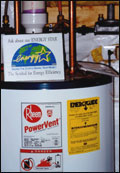Dear Umbra,
I have a question that’s been nagging at me for some time. Since I have a water heater inside my house, any waste heat from the water heater contributes to heating the house. Does it still make sense in terms of energy savings to put an insulating blanket on the water heater?
Kurt
Littleton, Colo.
Dearest Kurt,

Getting tanked.
Photo: PNNL.
After space heat — that is, heating your entire home — water heaters are the largest household energy consumers. Part of the reason the bill and the environmental burden are so high is that a tank water heater keeps the agua hot and ready to use at all times, though you may go hours without needing it. An old heater in a cold basement will bleed warmth from its walls, upping the energy required to keep the water inside hot enough for your next shower. Thus insulating blankets for older heaters are highly recommended by the experts. (Newer models come with decent insulation of their own.)
You’re right to question the value of an insulating blanket if the water heater is in a heated room inside your home. It’s not particularly efficient to use the water tank to heat your house, but if the tank is in a heated interior space, the blanket may be a lower priority. There are some easier steps you can take to save energy before wrassling a blankie onto the tank. Turn the thermostat on the heater down to 120 degrees and double-check the temperature of hot water from the tap to be sure you’re getting it right. Insulate the pipes that come in and out of the tank. (Ask for insulating tape or sleeves at the hardware store.) With electric heaters, turn the dang thing off if you’ll be gone for a few days; it will take about four hours to reheat the water when you come home. If you’ve done all that and are still looking for conservation opportunities, feel the side of the tank. If it’s warm, it probably could use a coat to keep that heat where it belongs.
Meanwhile, I have a public-service announcement related to your question. I recently learned that when tank water heaters fail, it is not the heater that fails; it is the tank. I learned this through experience, not some class I took on home appliances. So I am here to testify: If an expert gazes upon your water heater and tells you that its death is nigh, don’t just stash that information away in your mental file of future non-urgent projects. Replace that 50-gallon holding tank as soon as you feasibly can, before the bottom literally falls out and you’re left vacuuming water off your sodden floor.
Not only will you keep the hot water where it belongs, but you’ll be able to choose your new water heater with composure. Believe me, it’s hard to make an environmentally optimal decision when your basement’s been thoroughly bathed but you haven’t showered for days.
Desperately,
Umbra


